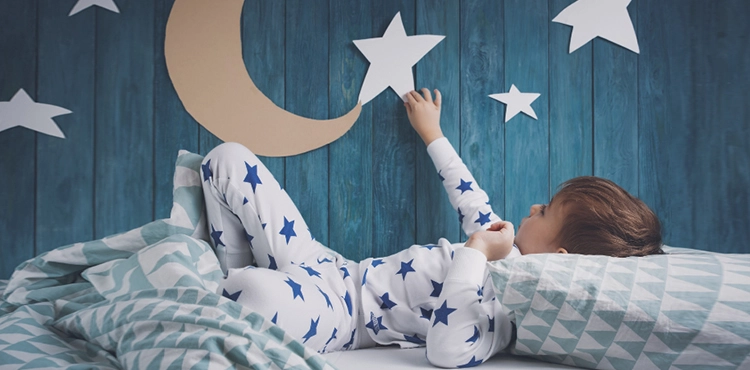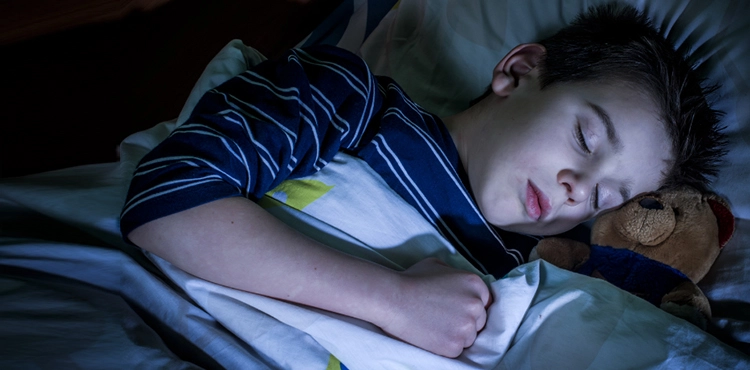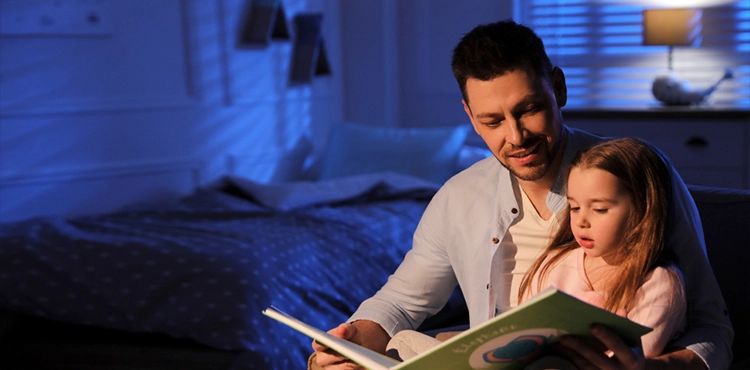The Truth about Autism and Sleep Problems
Updated on January 22, 2024
Ashley is just getting her coffee at work when the conversation between the three young moms at the water cooler turns to babies sleeping through the night. As they speak about their triumphs at finally getting a good night’s sleep, Ashley jumps in with a joke about forgetting what a full night’s sleep feels like. They all laugh.
But through Ashley’s smile, there’s a sort of sadness, a defeat. She may have older kids than these moms, but she can’t speak about the ordeal of not sleeping through the night as something in past tense. She’s an autism mom and she abides by a different set of rules (and milestones). Sleep, in her home, has been a long-term struggle.
Ashley’s not alone. According to a 2019 study, sleep disturbances affect about 80% of children with autism. In fact, it’s well known that these kids experience sleep issues twice as frequently as their peers.
The Four Most Common Questions about Autism and Sleep Problems
Here’s a roundup of the four most compelling questions people have regarding autism and sleep issues.
What Causes Sleep Disorders in Children with Autism?
While researchers still cannot pinpoint exactly why children with autism are more prone to sleep issues, they do have their theories. Let’s look at the five most popular theories.
- Heightened sensitivity: Because children with autism often have sensory sensitivities to sound, light, or touch, it can be more challenging for their brains to calm down enough to fall asleep.
- Abnormal melatonin production: Children with autism have trouble regulating the hormone involved in sleep, melatonin. This affects a person’s circadian rhythm (body clock).
- Difficulty reading social cues: Children with autism may have trouble making the connection between others in the house getting ready for bed and their own need to sleep.
- Comorbid conditions and meds: Many children with autism have comorbid conditions, like GI problems, ADHD, anxiety, asthma, epilepsy, or depression. Each of these is known to disrupt sleep. Some of the meds associated with these conditions can also disrupt sleep.
- Neurotransmitter abnormalities: Researchers hypothesize that neurotransmitter abnormalities in the brain may be responsible for reduced REM sleep. Research indicates that kids with autism may experience up to 10% less REM sleep. REM sleep is the restorative stage of sleep essential to brain development.
When Do Sleep Problems Start in Autism?
During the first few months of life, typically developing babies ease into a normal cycle of sleep and wakefulness. They gradually grow out of the frequency of their daytime naps, and start sleeping for longer periods of time at night. From infancy, children with autism may not develop these mature sleep patterns in step with their peers. They may continue to have difficulty falling asleep or sleeping through the night, and the problem can persist long after children start school.
What Types of Sleep Problems are Common with Autism?
For children with autism, the most common sleep problems include:
- Sleep-onset insomnia: This means having a hard time falling asleep. It’s the most common sleep issue described by parents of children with autism.
- Sleep apnea: This is when a child’s breathing is repeatedly disrupted, causing multiple partial awakenings. Snoring that is accompanied by pauses in breathing or gasping may be a sign of sleep apnea.
- Bedwetting: Late potty training and difficulties with potty training are common in autistic children. Some children wake up when they wet their bed. Some children wake to go to the bathroom, then can’t fall back asleep.

- Sleepwalking, nightmares, and night (or sleep) terrors: Sleepwalking is when a child walks around the room or house while being neither fully awake or asleep. Nightmares are bad dreams that may awaken kids and scare them enough to not be able to fall back asleep. Night terrors are episodes of intense panic or fear within the sleep-state (looking similar to nightmares but are not connected to dreams).
- Rhythmic movement disorder: These are rhythmic head or body-rocking movements that happen just before or during sleep.
- Restless leg syndrome (RLS): This neurological condition is characterized by an irrepressible urge to move the legs in an effort to stop a tingling feeling when falling asleep.
- Hypersomnia: This term refers to a number of conditions where a person sleeps more than normal or feels excessively tired during the day.
How Does Lack of Good Sleep Affect Autism?
Sleep deprivation can worsen autistic symptoms and significantly lower a child’s quality of life. According to research, insufficient sleep has been linked to the following traits:
- Poor cognitive performance
- Irritability
- Increased social problems
- Increased OCD and compulsive rituals
- Aggression
- Hyperactivity
- Depression
- Increased behavioral problems
How do I Know if my Autistic Child has a Sleep Disorder?
If your child regularly has trouble falling asleep or wakes up frequently during the night, he or she may have a sleep disorder. Make a doctor’s visit to seek clarification.
Many parents keep a one-week sleep diary to track how much and when their child is sleeping. By writing down your child’s sleep behavior, you might start to see a pattern or notice something in the environment that could be affecting their sleep.
Here are the recommended hours of sleep needed per night, by age:
- Ages 2-3: 12-14 hours
- Ages 4-5: 10-12 hours
- Ages 6-12: 10-11 hours
- Ages 13-18: 8-9 hours
- Ages 18+: 7-8 hours
How Can I Help My Autistic Child Sleep Better?

Fortunately, there are several ways parents can improve their child’s sleep. Here are the fundamentals to establishing good sleep hygiene:
- Sleep environment: Your child’s bedroom should be dark, quiet and cool. Use black-out curtains if necessary.
- Bedtime routine: Try to stick to the same bedtime routine each night, 20-30 minutes before bedtime. This includes bathtime, brushing teeth, donning favorite pajamas, snuggling favorite stuffed animals, reading bedtime stories, or using the white noise machine. Make sure your child goes to bed and wakes up at the same time every day.
- Read social stories together: Social stories are an easy and effective way for teaching kids to identify bedtime cues while reinforcing the idea of bedtime routines.
- Avoid electronics (phones, tablets, TV, video games): Before bed, these can be over-stimulating and their light can interfere with the body’s production of melatonin.
- Limit late naps: Naps are helpful for preschool children, but shouldn’t be taken too late in the afternoon as they can interfere with bedtime
- Teach how to fall asleep alone: It’s important for your child to learn the skill of falling asleep without parents. This will help ensure that they can self-soothe back to sleep if they awaken in the middle of the night.
- Exercise: Daytime exercise can make it easier to fall asleep and lead to deeper sleep. Just don’t schedule exercise too close to bedtime as it can be over-stimulating.
- Use relaxation techniques: Giving a gentle back massage, leading a guided meditation, or adding lavender oil into a child’s warm bath water are all really helpful with calming the senses.

- Limit liquids and caffeine: Drinking less before bed can help prevent bedwetting. Also, avoid caffeine close to bedtime (soda, coffee, tea, and chocolate).
- Avoid sudden transitions: Prepare your child for bedtime by reminding them that it’s coming up. This will prevent them from getting irritated by a sudden transition.
Here is a sampling of sleep products to consider:
- Melatonin supplements: Melatonin helps children with ASD fall asleep (on average) 28 minutes faster, and sleep 21 minutes longer. Ask your doctor about giving a melatonin supplement before bed.
- White noise machine: This is great for kids with noise sensitivity, as it blocks distracting household sounds when kids are falling asleep. A phone app with nature sounds or soothing music can do the trick as well.
- Weighted blankets: Weighted blankets can work wonders for restless kids. Sensory kids often find the warm, constant, deep pressure to be calming to the nervous system throughout the night.
- Anti-snoring devices: Children who snore may find relief from anti-snoring mouthpieces (fitted by dentists), anti-snoring nasal plugs, or pillows.
Here’s to a Good Night’s Sleep
If kiddo isn’t sleeping well, there’s a good chance you aren’t either. One recent study has shown that autism parents sleep less, have poorer sleep quality, and wake up earlier than parents of children without autism. AngelSense is a strong advocate for autism parents finding an online forum or community and getting the support they need–especially when attempting to improve sleep.
There’s hope. With time, we’re sure you’ll be sharing your triumphs in this area. Here’s wishing you good night, sleep tight, and don’t let the bedbugs bite!

